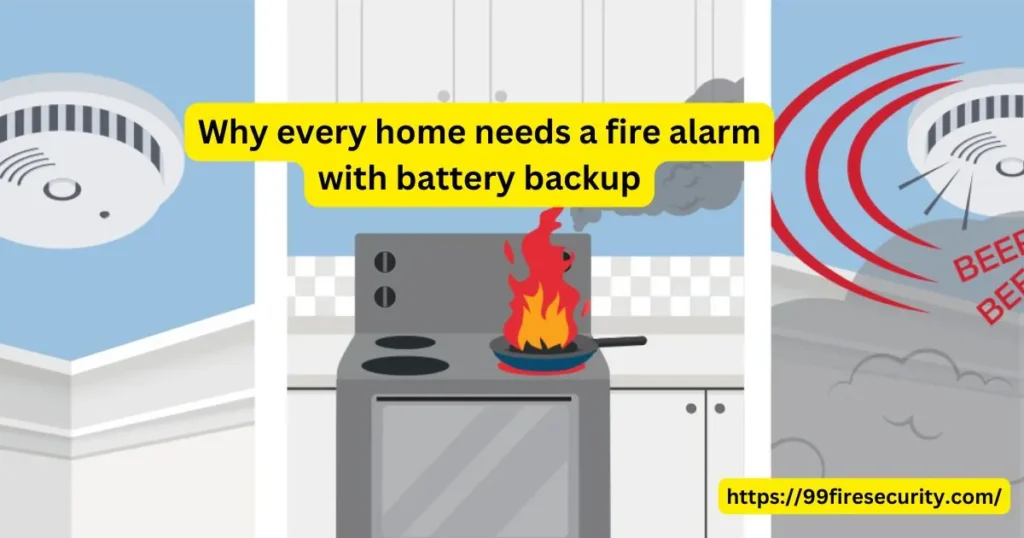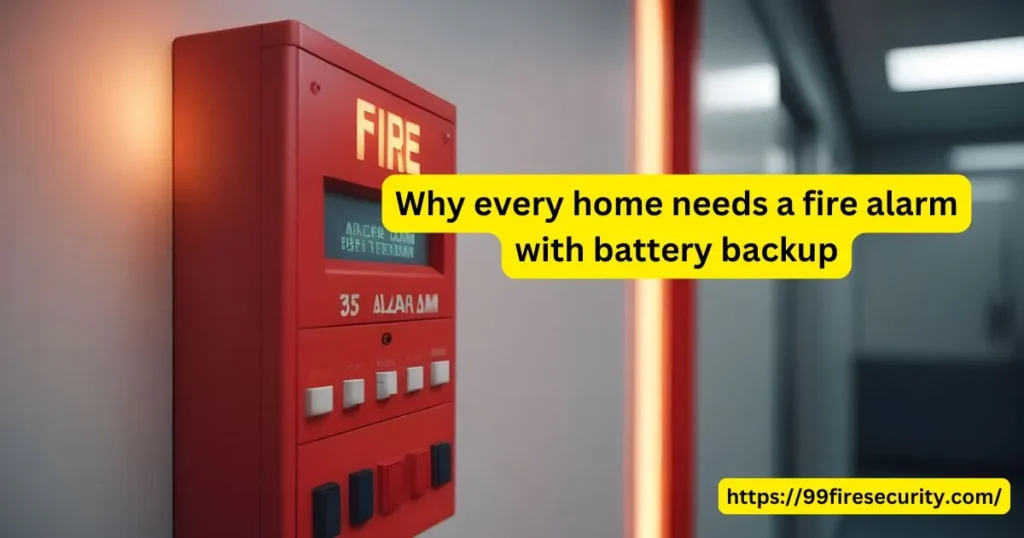Introduction
Each year, homes all over the world fall victim to devastating fires, resulting in the loss of life, property, and treasured memories. Although there has been a lot of development in fire safety measures, the most common tool to ensure home safety from fire is a fire alarm. But not just any fire alarm—a fire alarm with a dependable battery backup is critical. Example: When the power goes out, a fire breaks; without a battery backup, your fire alarm becomes ineffective when you need it most.
In this article, we’re going to discuss why having a fire alarm with battery backup is a must-have for modern home safety. From introducing their purpose to pointing out their life-saving potential, we’ll cover all the reasons to get one today.

Understanding Fire Alarms
What Is a Fire Alarm?
A firefighting alarm is a device that saves lives and protects against smoke, heat, or fire in your home. When activated, it produces an alarm—a loud, transmit, hard beeping sound — to warn the occupants inside the building of time to escape or fight the fire, if it is safe to do so. The fire alarm is the first line of defense when it comes to fire-related disasters.
Types of Fire Alarms
Different kinds of firefighting alarms that can be used for specific situations:
- Ionization Smoke Alarms: Better for fast-flaming fires.
- Photoelectric Smoke Alarms: Best for detecting smoldering fires that generate more smoke.
- Combination Alarms: These alarms feature both ionization and photoelectric sensors, providing full protection.
Battery Backup in Fire Alarms: The Why and the How
What Is a Battery Backup?
A battery backup is an alternative power source that is built into a fire safety system. This ensures that the alarm will still work in case of a power outage. Replaceable batteries are employed by some systems, while others use rechargeable ones.
Role of Battery Backup in Fire Alarms
Everybody hates running out of the power sometimes, be it for natural disasters or technical issues or maintenance work or anything. In such cases, a fire alarm without any battery backup becomes inoperable, leaving the protection of your home compromised. With a battery backup, the constant security of you and your loved ones is not compromised by the outside world.
Why Every Household Should Have a Fire Alarm with Battery Backup
Fire Alarms Save Lives
The main function of a firefighting alarm is a life-saving one. More than half of all fire-related deaths occur in homes that don’t have functioning fire alarms, according to the National Fire Protection Association. NFPA. An example is a fire alarm that includes a battery backup allowing you to still receive the alerts that could save your life during a power outage.
Fires can grow very quickly, in some cases developing within minutes. An early warning from a fire alarm makes it possible to evacuate safely and call emergency services before things escalate. The shriek of an alarm can rouse sleeping occupants, buying them precious seconds to escape.
Safeguarding the Property and Belongings
Life safety is a primary concern, however, firefighting alarms are vital to protecting your property and belongings as well. By alerting you early to the presence of flames, immediate action might be taken to minimize the extent of damage. Many fire alarm systems are capable of even activating sprinkler systems or notifying local fire departments, which in turn can minimize the time it takes to contain a fire.
This level of protection isn’t compromised during power failure with a fire alarm model that comes with battery backup, providing 24/7 peace of mind when it comes to the safety of your home and belongings.
Compliance with Regulations
In many places, fire alarms aren’t merely recommended — they’re mandated by law. Fire retrofits are usually a code requirement in residential spaces, and failure to comply may mean fines or other financial penalties.
As an example of this, certain jurisdictions require all firefighting alarms to be battery powered to work during a power outage scenario. The good news is that while upgrading your home for safety is always a good idea, staying compliant with laws can also help you avoid legal issues.
Choosing the Correct Fire Alarm with Battery Backup
Key Features to Look For
Here are some features to look for when choosing a firefighting alarm with a battery backup:
- Batteries: Lithium batteries have a longer lifespan and need to be changed out less than their counterparts.
- Dual-Sensor Technology — Combination alarms offer complete fire type detection.
- Smart Features: Certain alarms are compatible with smart home systems, allowing you to receive alerts on your smartphone.
- Interconnected Systems: When one alarm is triggered, all interconnected alarms within the home will sound so that everyone is alerted.

Installation Tips
In order for the firefighting alarm to work effectively, it needs to be placed correctly. Here are some tips:
- Have at least one alarm on every level of the home, including basements and attics.
- Install alarms inside and outside sleeping areas.
- Don’t install alarms near windows, doors, or air vents, as drafts can disrupt their workings.
- Performing routine maintenance, like testing alarms monthly and replacing batteries as needed, keeps your system reliable.
- The Dangers of Not Having a Battery-Operated Fire Alarm
Increased Risk of Fatalities
Without a fire alarm — or one that doesn’t work during power outages — your chance of missing crucial early warnings skyrockets. Fires most commonly happen at night, when families are sleeping, making an effective alarm crucial for helping wake up occupants quickly.
Higher Property Loss
Without an early warning, a fire has a longer time to spread, leading significant destruction to your house and valuables. Having a functioning alarm with a battery backup will help reduce this risk and will allow people to be alarmed in time.
Legal & Financial Consequences
In many places, working Firefighting is required and can lead to legal trouble, particularly if your household is rented or falls under governing building codes. Insurance claims can also be denied if it turns out a legally required fire alarm was not installed or working.
Fire Alarm System Preventative Maintenance
Regular Testing
Test your firefighting alarm on a monthly basis to make sure they’re functioning properly. Most alarms come with a “test” button that activates the alert sound. If weak or no sound, time to check batteries or get new unit.
When it comes to replacing batteries and devices
Long-life battery alarms also need maintenance. Replace the old-style batteries once a year, or when the low-battery chirp sounds. Also, as the sensors do go high-wear, replace the whole Firefighting alarm unit every 7-10 years.
Professional Inspections
Professional technicians are hands-on and can give extensive inspections for your system and so you are never out of order. They can also advise whether any items need to be upgraded or replaced.
Mistaken Beliefs About Fire Alarms
“THE ELECTRICITY IS OUT, AND SO ARE THE FIRE ALARMS.”
This misconception comes from the idea that all alarms are electrified. Modern fire alarms have battery backups specifically for this reason, so they are guaranteed to work even during a blackout.
“One Fire Alarm Is All You Need for a House”
Fire does not spread in predictable patterns, so counting on a single alarm is not safe. When placed throughout the home in strategic areas, multiple alarms provide comprehensive protection.
“Power Backup Systems Are Not Required”
Some people think power outages don’t happen frequently enough to necessitate a battery backup device. Nonetheless, just one moment of lost power during a fire could be devastating. Battery backups provide a critical defense against this risk.

State of the Art Technologies in Fire Alarms
Smart Fire Alarms
Smart fire alarms link to your home’s Wi-Fi and transmit messages to your phone. This is especially helpful when you’re away from home, letting you alert emergency services in a flash.
Interconnected Systems
Interconnected Firefighting alarms talk to each other, so when one alarm goes off for a fire, all alarms in the system will sound together. This is particularly useful in larger homes or multi-story buildings.
Conclusion
A Firefighting alarm with a battery backup is not merely a device; it’s a lifeline. This protects you and your family from fire dangers during random power outages. The cost of such a system is little compared to the benefits of peace of mind and safety. Take the first step for the safety of your home today and invest in a fire alarm with a battery backup to ensure The safety of your loved ones and your valuables.
FAQs
How long should a fire alarm last?
Fire alarms most commonly last 7-10 years. After this time, their sensors may decline, and we recommend a change.
How often do you replace batteries in fire alarms?
Batteries need to be changed at least once a year, or when the low-battery indicator goes off.
What is a better: hardwired fire alarm or battery-powered?
Hardwired alarms provide greater reliability, though they must have a battery backup to function during a power outage.
How to Install Firefighting Alarms—Can You Do it Yourself?
Yes, most Firefighting alarms are DIY installation and will do so. But if you’re not a DIY-er, a professional installation will guarantee correct placement and function.
How much do fire alarms with battery backup cost?
Prices depend on features, with basic models costing from about $20 to $100, and advanced systems costing more.


